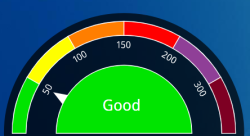
Concerned about air quality? We are too. Learn how to be safe and informed.

What is the Air Quality Index (AQI)?
The AQI is a yardstick that measures how clean or polluted your air is, and what associated health effects might be a concern for you. It provides simple, color-coded ratings that help us understand the quality of the air we're breathing.

Here's a quick breakdown:
Why Should You Care?
Air quality can impact our health in several ways. Short-term effects include irritation in the eyes, nose, and throat, shortness of breath, and exacerbation of asthma and other respiratory conditions. Long-term exposure to poor air quality can lead to chronic respiratory diseases and other health problems. It's also crucial for physical activities - poor air quality can make exercising outdoors difficult and even harmful.
What Can You Do?
First and foremost, stay informed! You can check the AQI for the Hanover area by clicking here.
When air quality is poor, try to limit outdoor activities, especially strenuous ones like running or biking. Consider indoor alternatives like utilizing the college fitness centers or doing an at-home workout.
Also, don't forget about your indoor air quality. Small actions, like keeping your living space clean, avoiding indoor smoking, and even keeping indoor plants can contribute to better indoor air quality.